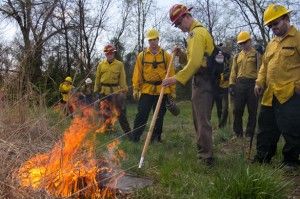New center brings faculty, students together through volunteerism

March 20, 2012
Students and faculty now have a volunteer resource with the new Center for Service-Learning and Volunteerism located in the Student Center.
The center provides a way for faculty to incorporate service-learning and volunteerism into thier curriculum so students who take part can receive credit for their work, said Peter Gitau, assistant vice chancellor and dean of students, and chair of the Service Learning Committee.
Advertisement
Although there was an office that previously did similar work, the new center, which started about a month ago, strives to improve the connection between volunteering and classwork, an area where the former Office of Service-Learning was lacking, Gitau said.
“There was not a system that tied these events into curriculum; the center marries the two,” Gitau said. “A faculty member has the chance to bring in a syllabus that they plan to use in class, learn from the center and integrate activities into their curriculum. Through this center, students can find a course that will recognize those services and activities and give them credit.”
Mythili Rundblad, co-director of the center, said nonprofit organizations and Registered Student Organizations at SIUC team up with the center to provide service outlets for students.
Rundblad said the office works with more than 60 nonprofit organizations such as schools, youth development centers and agencies that strive to promote art and culture.
She said the center works with several RSOs, individual students and residence hall staff to promote student civic involvement. Several hundred students participate in Saluki Volunteer Corps, one of the RSOs with the most student involvement, doing a wide range of service projects, she said.
Rundblad said she focuses on civic engagement, or working to make a difference in the community, by working with programs such as the Saluki Volunteer Corps, AmeriCorps and Service-Learning.
Roudy Hildreth, an assistant professor of political science who wrote two books on service-learning and worked in the field world-wide, handles faculty and technical assistance at the center.
Advertisement*
“If someone involved in forestry wants to volunteer helping children clean up the forest, we can help them find a venue and relations to get the project started, while receiving credit in the course,” he said.
Hildreth said faculty who use the program enjoy it because it makes their classroom different. He said both teachers and students can appreciate changes in academic content that service-learning can provide.
Although the Center for Service-Learning and Volunteerism has only recently materialized, it has been in the works for several years, Hildreth said.
Gitau said the office that preceded and became the foundation for the center did a good job, but he said his goal was to enhance the mission of the office and tie it more with academics — an idea that took 12 years to formalize.
Rundblad said she has been involved with the organizations that work with the center for 13 years.
Hildreth said the center now has proper funding from various grants and Student Development and can reach its full service and volunteer potential. He said the exact amount the center will require to run is unknown because the center only recently started.
Rundblad said she hopes that reflection of the volunteer work accomplished will allow for students to become excited about the service-learning experience.
“While volunteerism helps in becoming aware of a community need, service-learning lets a student learn about that community need or grassroot issue through the lens of the academic discipline,” she said.
Advertisement








